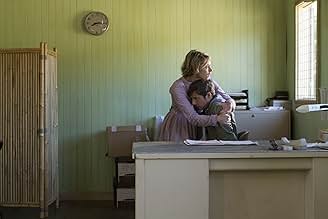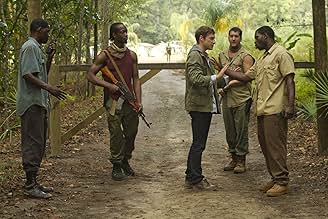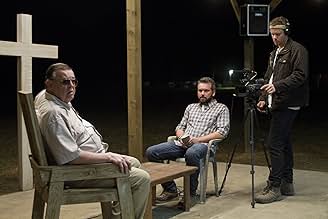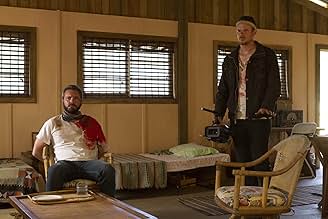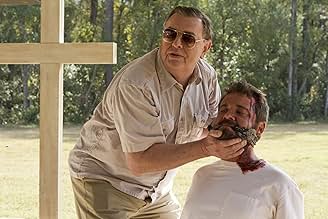AVALIAÇÃO DA IMDb
6,1/10
22 mil
SUA AVALIAÇÃO
Uma equipe de jornalistas segue um homem enquanto ele viaja para o mundo da Paróquia do Éden para encontrar sua irmã desaparecida, onde fica claro que este paraíso pode não ser o que parece.Uma equipe de jornalistas segue um homem enquanto ele viaja para o mundo da Paróquia do Éden para encontrar sua irmã desaparecida, onde fica claro que este paraíso pode não ser o que parece.Uma equipe de jornalistas segue um homem enquanto ele viaja para o mundo da Paróquia do Éden para encontrar sua irmã desaparecida, onde fica claro que este paraíso pode não ser o que parece.
- Direção
- Roteirista
- Artistas
- Prêmios
- 4 vitórias e 12 indicações no total
Reginald Lashaun Clay
- Robert
- (as Lashaun Clay)
Christian Ojore Mayfield
- Pilot
- (as Christian O'Jore)
Avaliações em destaque
This is basically a re-telling of the Jonestown Massacre, which, if anyone doesn't know, is a real event that happened in the late 1970's, when a megalomaniac by the name of Jim Jones brought several hundred members of a religious group called the People's Temple to a remote jungle location in Guyana.
After a small cadre of politicians arrived by a small private plane to respond to several requests from disillusioned members of the congregation, there suddenly was a desperate stampede by a number of the group to leave the compound. Jim Jones then ordered the guards to shoot the members who were attempting to leave, and gave the entire crowd each a cup of kool-aid laced with cyanide in a mass suicide.
The event was forgotten for many years, and has been dramatized in this film, which takes the original story and hams it up for the camera, by taking the stance of a "reality" show approach to the filming.
Unfortunately, the experiment fails to generate the sense of reality that the filmmakers were attempting to capture, and the feeling is much more forced rather than coming from a real event. Although it was a reasonably noble attempt to make a notorious situation somehow believable, by it's very nature, it is doomed. It would have been much more believable if the film were just shot as a normal film would be, without the extra layer of a "found footage" project.
Since the camera is always supposed to be running, there are moments in the film in which the actors have to look directly into the lens and explain that the camera is going to keep running "so that there is a record of whatever happens," which completely destroys any sense of the reality of the moment -- the idea of deliberately having a camera in someone's hand in each scene is so unbearably false that the viewer is immediately left wondering why on earth they even thought this technique would help to make the story seem "real." In fact, it does the exact opposite.
The use of the hand-held 'shaky cam' in almost every scene is utterly unmotivated -- in what would be the climax of the movie, the camera is so ridiculously present that it almost seems like SNL decided to take the idea and turn it into one of Andy Samberg's sarcastic short films, because they have used such a heavy-handed approach to the material.
In telling the story of Jonestown, nothing would have been needed other than to have just told the story as it unfolded without the addition of this added layer of "reality" -- and it would have been a much more superior film. This, sadly, destroys any chance of that happening.
The story of the People's Temple deserves better treatment than this, and, given a more experienced filmmaker, would have had a much deeper impact. I regret that we have lost that opportunity now, having seen this approach fail.
After a small cadre of politicians arrived by a small private plane to respond to several requests from disillusioned members of the congregation, there suddenly was a desperate stampede by a number of the group to leave the compound. Jim Jones then ordered the guards to shoot the members who were attempting to leave, and gave the entire crowd each a cup of kool-aid laced with cyanide in a mass suicide.
The event was forgotten for many years, and has been dramatized in this film, which takes the original story and hams it up for the camera, by taking the stance of a "reality" show approach to the filming.
Unfortunately, the experiment fails to generate the sense of reality that the filmmakers were attempting to capture, and the feeling is much more forced rather than coming from a real event. Although it was a reasonably noble attempt to make a notorious situation somehow believable, by it's very nature, it is doomed. It would have been much more believable if the film were just shot as a normal film would be, without the extra layer of a "found footage" project.
Since the camera is always supposed to be running, there are moments in the film in which the actors have to look directly into the lens and explain that the camera is going to keep running "so that there is a record of whatever happens," which completely destroys any sense of the reality of the moment -- the idea of deliberately having a camera in someone's hand in each scene is so unbearably false that the viewer is immediately left wondering why on earth they even thought this technique would help to make the story seem "real." In fact, it does the exact opposite.
The use of the hand-held 'shaky cam' in almost every scene is utterly unmotivated -- in what would be the climax of the movie, the camera is so ridiculously present that it almost seems like SNL decided to take the idea and turn it into one of Andy Samberg's sarcastic short films, because they have used such a heavy-handed approach to the material.
In telling the story of Jonestown, nothing would have been needed other than to have just told the story as it unfolded without the addition of this added layer of "reality" -- and it would have been a much more superior film. This, sadly, destroys any chance of that happening.
The story of the People's Temple deserves better treatment than this, and, given a more experienced filmmaker, would have had a much deeper impact. I regret that we have lost that opportunity now, having seen this approach fail.
The film is among the found footage genre. It leads in with some decent photography, nice ambient soundtrack, and some pretty good acting. The suspense builds with a decent and slow momentum, but unfortunately doesn't lead to anything interesting or unique. The film had a really nice opportunity to go down a different path. It had all the qualities to do so and be good. Unfortunately it just decided to re hash an old story and try to deliver it as something new. I can give it five out of 10 for keeping me interested until the climax good photography and nice track, but the subsequent let down can't allow me to give it anything higher. If you are interested in something like this I would recommend a documentary on Jonestown. There are many good ones out there.
This was an almost exact telling of the Jonestown Massacre. The only differences were the date because it was present day, a film crew came with a parishioners relative rather than a congressman and there were not as many victims.
The Sacrament is a fairly straightforward movie. It's about a group of guys who are part of a documentary film group and one of the guys' sister moves into an isolated commune and the film crew wants to know the full scoop. You'll know exactly where this movie is going as it progresses, but that isn't necessarily a bad thing. It gives a chance for director Ti West to establish some character background and vague insights into the religious group while slowly turning the creep dial up until the movie's climax. The acting is good across the board, the standout being the Father (Gene Jones) who is suitably charismatic as the cult's ominous leader. For a found-footage movie it's shot well, but of course there are the typical issues that come with the turf - impossible angles, how the footage was even found - but these are things you'd know going in. The movie itself is a well executed, suspenseful slow burn.
The biggest fault in The Sacrament is its predictability. Again, it's not a bad thing, we just know what's coming at every turn. Creepy cult, innocent people poking their noses in places they don't belong, an underlying dark scheme that slowly unravels to the protagonists. If that kind of stuff interests you and you're willing to forgive the tropes that come with the genre, The Sacrament is a worthwhile watch.
The biggest fault in The Sacrament is its predictability. Again, it's not a bad thing, we just know what's coming at every turn. Creepy cult, innocent people poking their noses in places they don't belong, an underlying dark scheme that slowly unravels to the protagonists. If that kind of stuff interests you and you're willing to forgive the tropes that come with the genre, The Sacrament is a worthwhile watch.
The journalist Patrick (Kentucker Audley) works at the VICE, a company dedicated to cover bizarre news. When his sister Caroline (Amy Seimetz) joins a community, she travels abroad with her new family. Out of the blue, Caroline invites her brother to visit her in an undefined country and Patrick travels by helicopter with his friends Jake (Joe Swanberg) and Sam (AJ Bowen) that work with him at VICE.
They find weird that the men that have come to guide them to the Eden Parish have guns. On the arrival to the camp, Patrick, Sam and Jake find a community of happy people that worship Father (Gene Jones). They interview Father but soon they realize that people are not as happy as they seem to be. Further, they find that they are trapped in the Parish Eden and they want to leave the place with the newcomers. But the Father does not have intention to let them go.
"The Sacrament" is a suspenseful horror movie with a music score in the beginning that recalls "The Twilight Zone". However this awful "found- footage" genre spoils the creepy story. The Dogma 95 has only 77 recognized movies, but this rip-off of the genre seems to be the easiest means to produce cheap low-budget movies in the present days. My vote is five.
Title (Brazil): "O Sacramento" ("The Sacrament")
They find weird that the men that have come to guide them to the Eden Parish have guns. On the arrival to the camp, Patrick, Sam and Jake find a community of happy people that worship Father (Gene Jones). They interview Father but soon they realize that people are not as happy as they seem to be. Further, they find that they are trapped in the Parish Eden and they want to leave the place with the newcomers. But the Father does not have intention to let them go.
"The Sacrament" is a suspenseful horror movie with a music score in the beginning that recalls "The Twilight Zone". However this awful "found- footage" genre spoils the creepy story. The Dogma 95 has only 77 recognized movies, but this rip-off of the genre seems to be the easiest means to produce cheap low-budget movies in the present days. My vote is five.
Title (Brazil): "O Sacramento" ("The Sacrament")
Você sabia?
- CuriosidadesGene Jones nailed his big interview scene in a single seventeen minute take.
- ConexõesAlternate-language version of O Massacre da Guiana (1979)
- Trilhas sonorasHeartbeats
Words and Music by Olof Dreijer (as Olof Bjorn Dreijer) & Karin Dreijer (as Karin Elizabeth Dreijer Andersson)
© Universal - Polygram International Publishing Inc. On behalf of Bert's Songs Ltd. (ASCAP)
Performed by The Knife
Courtesy of Mute & Rabid Records
By arrangement with Bank Robber Music
Principais escolhas
Faça login para avaliar e ver a lista de recomendações personalizadas
- How long is The Sacrament?Fornecido pela Alexa
Detalhes
- Data de lançamento
- País de origem
- Centrais de atendimento oficiais
- Idioma
- Também conhecido como
- The Sacrament
- Locações de filme
- Empresas de produção
- Consulte mais créditos da empresa na IMDbPro
Bilheteria
- Orçamento
- US$ 4.000.000 (estimativa)
- Faturamento bruto nos EUA e Canadá
- US$ 9.221
- Fim de semana de estreia nos EUA e Canadá
- US$ 583
- 8 de jun. de 2014
- Faturamento bruto mundial
- US$ 9.221
- Tempo de duração
- 1 h 39 min(99 min)
- Cor
- Mixagem de som
- Proporção
- 1.85 : 1
Contribua para esta página
Sugerir uma alteração ou adicionar conteúdo ausente





